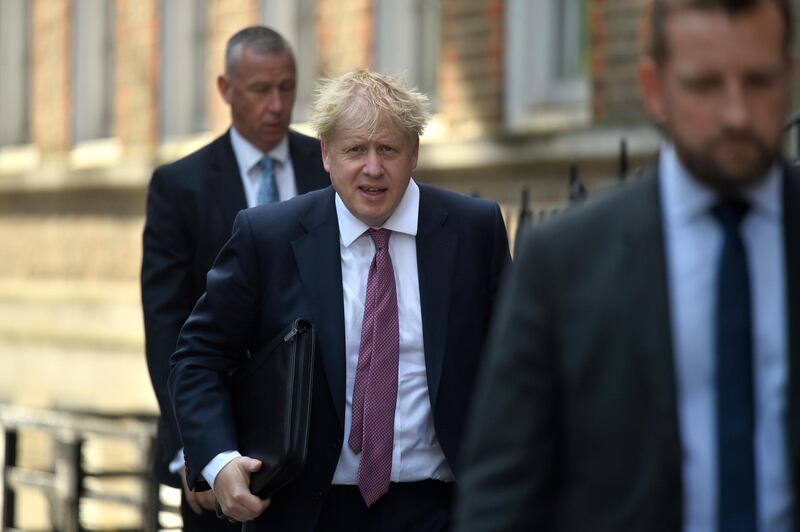Britain's incoming Prime Minister, Boris Johnson, will face numerous immediate challenges – not least the Iran shipping crisis - but standing above them all will be that of Brexit. Here, whatever he does will be shaped by the linked constraints of time and of parliamentary arithmetic.
As regards time, Britain is due to leave the EU on October 31 and Johnson has made doing so, rather than seeking a further extension, the non-negotiable cornerstone of his leadership. That is a shade over three months away but the reality in terms of “political time” – given summer holidays in London and Brussels, and the British parliament’s break for party conferences in September – is much shorter.
During that period, Johnson is either going to have to renegotiate the Brexit deal or decide to leave without a deal. There is very little sign that the EU will change the substance of the withdrawal agreement, including the defining issue of the “backstop” arrangements for the Irish border. So, the choices will quickly become a cosmetically changed deal or no deal.
It is here that the parliamentary arithmetic becomes crucial. The Tory Party does not have a majority by itself, and relies upon the votes of the Democratic Unionist Party (DUP) for a working majority. This currently stands at four but may well be reduced to three after a by-election due on August 1.
Given the splits within his party over Brexit, proposing a cosmetically changed deal would almost inevitably mean that the pro-Brexit wing would vote it down, as they did Theresa May’s version. It’s likely that even a substantively changed deal would be insufficient for some of them. In particular, it has been posited that he might seek to change the current withdrawal agreement so that the Irish backstop customs measures applied only to Northern Ireland, rather than to the UK as a whole. That is the one change the EU might well accept, as it was in fact the original proposal. But, then, he would lose DUP support.
So, either as his first or second choice, that leaves no deal. But that would be opposed by the other wing of his party, comprising those who are either anti-Brexit or at least opposed to no-deal Brexit. Their ranks will be swelled by the arrival of several ex-ministers, including the former chancellor Philip Hammond, on the backbenches. If given the chance, parliament will prevent no deal.
That might involve forcing the government to seek another extension – but the EU would probably only grant that if there was a plan for an election or another referendum. It might involve forcing the government to revoke Article 50 notification and halt Brexit altogether, although that is extremely unlikely. It might mean bringing down the government in a vote of no confidence.
For this reason, there has been much talk that Johnson might “prorogue” or suspend parliament, to allow no deal to happen by default, but there are many complex procedures that parliamentarians can use to prevent this. They have already taken the first steps towards doing so. So, it is very unclear that prorogation would succeed. It might also face legal challenge, and it would certainly prompt a major political and constitutional crisis.
The only way of changing the parliamentary arithmetic is by having a general election. That could happen if the opposition win a no confidence vote or – through more complex procedures – could be initiated by Johnson.
However, here again time is a factor. There would not be enough time before October 31 to hold one, so another extension would be needed. But that would mean Johnson fighting an election having broken his central, defining pledge on the leaving date. That would see him losing significant numbers of voters to the new Brexit Party. It is therefore very likely that Johnson would lose such an election.
Alternatively, if Johnson does manage to force through no-deal Brexit then the resultant splits in his party, along with his lack of majority, would see him fighting an election immediately afterwards, against the backdrop of what could be extensive economic dislocation or, at least, significant disruption. Moreover, many voters will recall that nothing remotely like this was promised by Johnson himself, when he led the campaign to leave the EU in 2016. In these circumstances, too, he would be likely to lose an election.
There are many permutations of how these different scenarios could play out. But all of them run into some version of the same basic realities of time and numbers, as well as the fact that the electorate are as bitterly divided by Brexit as their politicians. Any path that Johnson might choose seems to have one unmovable blockage or another.
It is in the nature of things that something will happen, however unlikely it now seems. No one can say what that will be. That probably extends to Johnson himself, unless he has some plan up his sleeve that he has not yet announced, and which no one else has thought of. One thing he will be aware of, having for so long yearned to hold the office, is that the record for the shortest tenure as prime minister is 119 days.
As things stand, Johnson has 100 days to deliver his Brexit promise. If he fails to do so, he may well end up setting a new record. The same may apply if he succeeds.
Chris Grey is a professor of organisation studies at Royal Holloway, University of London and the author of The Brexit Blog





